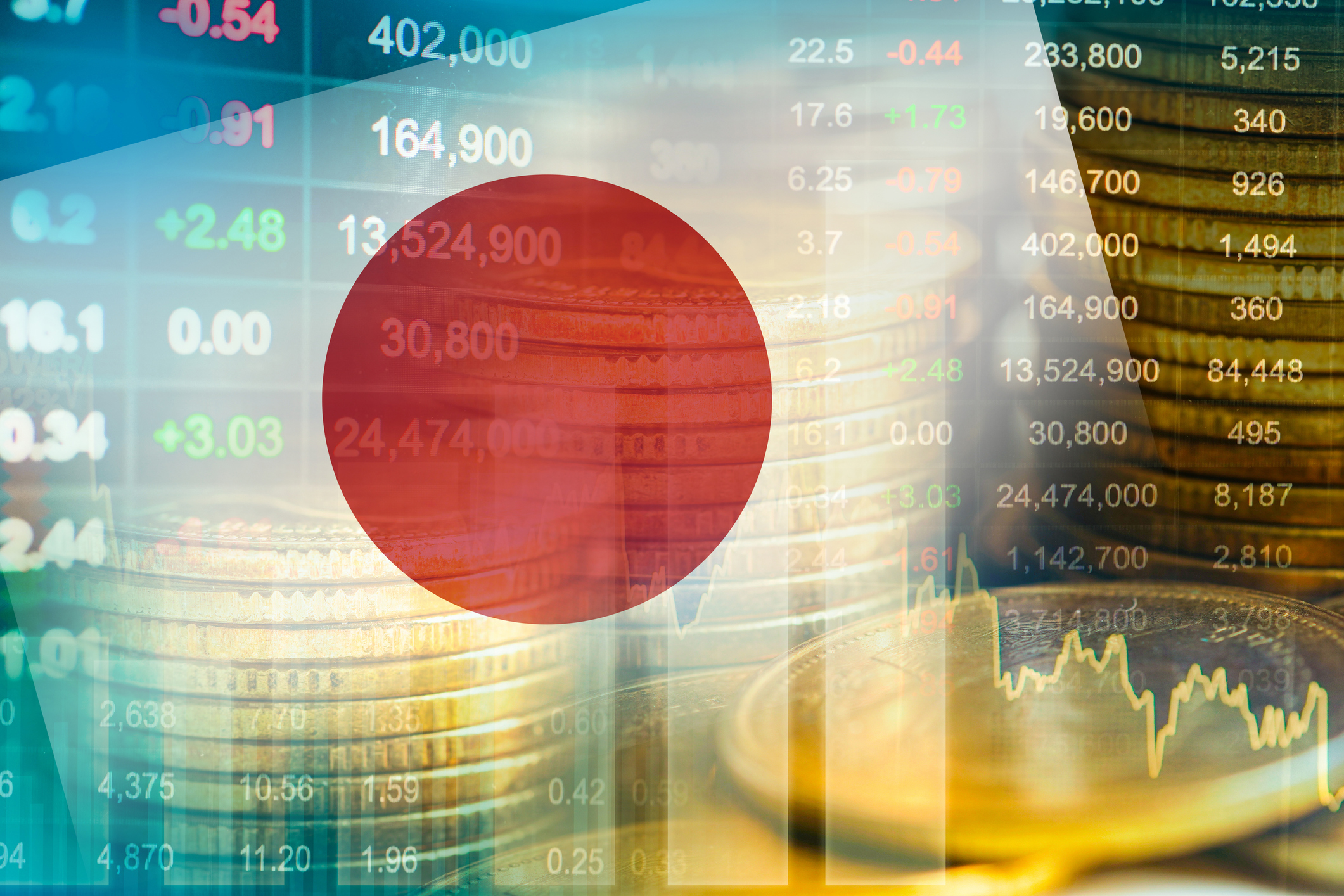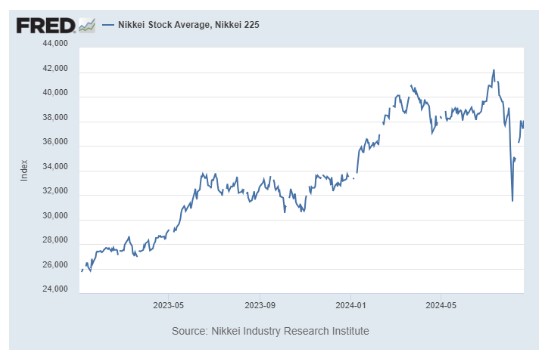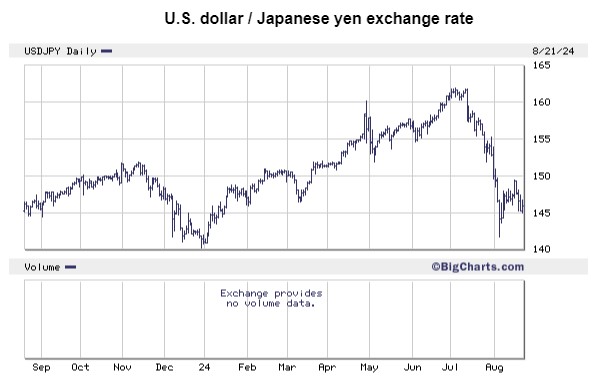Japan's Stock Market Crash and Recovery: What Happened and What Investors Can Do
Japan's stock market suffered its biggest one-day drop since Black Monday in August but quickly bounced. Here's what happened and what it means for investors.


Profit and prosper with the best of Kiplinger's advice on investing, taxes, retirement, personal finance and much more. Delivered daily. Enter your email in the box and click Sign Me Up.
You are now subscribed
Your newsletter sign-up was successful
Want to add more newsletters?

Delivered daily
Kiplinger Today
Profit and prosper with the best of Kiplinger's advice on investing, taxes, retirement, personal finance and much more delivered daily. Smart money moves start here.

Sent five days a week
Kiplinger A Step Ahead
Get practical help to make better financial decisions in your everyday life, from spending to savings on top deals.

Delivered daily
Kiplinger Closing Bell
Get today's biggest financial and investing headlines delivered to your inbox every day the U.S. stock market is open.

Sent twice a week
Kiplinger Adviser Intel
Financial pros across the country share best practices and fresh tactics to preserve and grow your wealth.

Delivered weekly
Kiplinger Tax Tips
Trim your federal and state tax bills with practical tax-planning and tax-cutting strategies.

Sent twice a week
Kiplinger Retirement Tips
Your twice-a-week guide to planning and enjoying a financially secure and richly rewarding retirement

Sent bimonthly.
Kiplinger Adviser Angle
Insights for advisers, wealth managers and other financial professionals.

Sent twice a week
Kiplinger Investing Weekly
Your twice-a-week roundup of promising stocks, funds, companies and industries you should consider, ones you should avoid, and why.

Sent weekly for six weeks
Kiplinger Invest for Retirement
Your step-by-step six-part series on how to invest for retirement, from devising a successful strategy to exactly which investments to choose.
To say that the action in Japan's stock market this year has been a wild ride would be an understatement.
The Nikkei 225, Japan's benchmark index, was up close to 27% for the year at its high in July … and then August happened. Stock prices collapsed on August 5, dropping 12% on the day – the largest single-session drop since Black Monday – and bringing the total decline from the July top to 27%.
Then, on August 6, the Nikkei enjoyed its biggest one-day gain since 2008, and it's been inching higher ever since.
From just $107.88 $24.99 for Kiplinger Personal Finance
Become a smarter, better informed investor. Subscribe from just $107.88 $24.99, plus get up to 4 Special Issues

Sign up for Kiplinger’s Free Newsletters
Profit and prosper with the best of expert advice on investing, taxes, retirement, personal finance and more - straight to your e-mail.
Profit and prosper with the best of expert advice - straight to your e-mail.

So, what on earth happened to Japanese stocks?
And more importantly, what should we do about it as investors?
Why did Japan's stock market crash?
To get an understanding of what roiled Japan's stock market, let's head back to the "fear-of-missing-out" (FOMO) days of the pandemic in America.
In early 2020, the Federal Reserve lowered interest rates to zero and then proceeded to hoover up $5 trillion in bonds in one of the largest quantitative easing programs in history. The combination of ultra-low rates and excessive stimulus by the Fed created an environment of abundant liquidity and a low opportunity cost for risk-taking. Investors had every incentive to gamble.
We know what happened next. The Fed's aggressive monetary policy injected massive liquidity into the financial system. This excess liquidity flowed into the stock market, driving up asset prices. Additionally, government stimulus checks provided direct financial support to individuals, some of which was invested in the stock market.
As stock prices soared, especially in high-growth sectors like technology, retail investors were driven by FOMO. Seeing the rapid gains made by others, they rushed to invest, further inflating asset prices. This feedback loop led to a euphoric market environment where valuations detached from fundamentals.
The FOMO rally came to an abrupt end in 2022. Once the Federal Reserve stopped injecting liquidity into the financial system and raised interest rates, the party was over, and we entered a bear market.
And here's where we turn to Japan.
The Bank of Japan never followed the Fed's lead in tightening monetary policy, keeping Japanese rates pegged at absurdly low levels. Up until March, the benchmark rate was actually negative at -0.1%. And even after March's "historic" rate hike – the first in 17 years – the target range for interest rate was only 0.0% to 0.1%.
So, Japanese investors had every incentive to pull their cash out of the bank and put it literally anywhere else. As was the case in the U.S. during the 2020-2021 FOMO market, a lot of Japanese cash made its way into the Japan's stock market, pushing prices higher.
The carry trade goes sideways
Not all of the cash stayed in Japan, though. Some made its way overseas via the "carry trade." Both Japanese and foreign investors alike had the opportunity to borrow free money in yen and then turn around and invest it in higher-yielding currencies like the U.S. dollar.
Their actions created a virtual cycle. The constant selling pressure on the yen and buying pressure on the dollar helped to push the dollar sharply higher relative to the yen. So, the investors playing the carry trade made money two ways. First, on the higher yielding assets and second on the currency move.
But why settle for a 5% money market rate when you can really add some sizzle with American tech stocks? The same dynamic applied. No matter how much money an American stakeholder made in Nvidia (NVDA) and the other Magnificent 7 stocks, a Japanese investor made more due to the constant depreciation of the yen.
And then it all went into reverse.
Fed Chair Jerome Powell indicated that a September rate cut might be on the table around the same time the Bank of Japan started to talk a good game about raising interest rates further.
This was enough to prompt a partial unwinding of the carry trade. The dollar dropped by about 12% relative to the yen in July and early August, which is a massive move in a short period for a developed world currency.

This sudden strength in the yen was destabilizing and culminated in the volatility storm we saw in early August, which sent the Cboe Volatility Index (VIX) – the volatility measure known popularly as the "fear gauge" – on its largest one-day spike ever.
What can investors do about Japan's stock market volatility?
Japan is a world away and there are not a lot of Americans that are invested in the land of the rising sun. But markets are interconnected, and liquidity sloshes across borders. If the yen continues to strengthen relative to the dollar – and this is likely if the Fed moves forward with lowering interest rates – then we're going to see a continued unwinding of the carry trade with all of the volatility that implies.
For most investors, there is actually little that can be done. Speculating on the yen's move is not going to be practical for the typical investor with a 401(k) plan or an IRA just looking to earn a reasonable return.
But the volatility storm we saw in early August should be a wake up call to review your portfolio and be sure you're taking an appropriate level of risk. After the run we've enjoyed in the market this year, it might make sense to rebalance, take a little risk off the table, and shift a little more of your portfolio into bonds and cash.
Related content
Profit and prosper with the best of Kiplinger's advice on investing, taxes, retirement, personal finance and much more. Delivered daily. Enter your email in the box and click Sign Me Up.

Charles Lewis Sizemore, CFA is the Chief Investment Officer of Sizemore Capital Management LLC, a registered investment advisor based in Dallas, Texas, where he specializes in dividend-focused portfolios and in building alternative allocations with minimal correlation to the stock market.
-
 Quiz: Do You Know How to Avoid the "Medigap Trap?"
Quiz: Do You Know How to Avoid the "Medigap Trap?"Quiz Test your basic knowledge of the "Medigap Trap" in our quick quiz.
-
 5 Top Tax-Efficient Mutual Funds for Smarter Investing
5 Top Tax-Efficient Mutual Funds for Smarter InvestingMutual funds are many things, but "tax-friendly" usually isn't one of them. These are the exceptions.
-
 AI Sparks Existential Crisis for Software Stocks
AI Sparks Existential Crisis for Software StocksThe Kiplinger Letter Fears that SaaS subscription software could be rendered obsolete by artificial intelligence make investors jittery.
-
 5 Top Tax-Efficient Mutual Funds for Smarter Investing
5 Top Tax-Efficient Mutual Funds for Smarter InvestingMutual funds are many things, but "tax-friendly" usually isn't one of them. These are the exceptions.
-
 Why Invest In Mutual Funds When ETFs Exist?
Why Invest In Mutual Funds When ETFs Exist?Exchange-traded funds are cheaper, more tax-efficient and more flexible. But don't put mutual funds out to pasture quite yet.
-
 Social Security Break-Even Math Is Helpful, But Don't Let It Dictate When You'll File
Social Security Break-Even Math Is Helpful, But Don't Let It Dictate When You'll FileYour Social Security break-even age tells you how long you'd need to live for delaying to pay off, but shouldn't be the sole basis for deciding when to claim.
-
 I'm an Opportunity Zone Pro: This Is How to Deliver Roth-Like Tax-Free Growth (Without Contribution Limits)
I'm an Opportunity Zone Pro: This Is How to Deliver Roth-Like Tax-Free Growth (Without Contribution Limits)Investors who combine Roth IRAs, the gold standard of tax-free savings, with qualified opportunity funds could enjoy decades of tax-free growth.
-
 One of the Most Powerful Wealth-Building Moves a Woman Can Make: A Midcareer Pivot
One of the Most Powerful Wealth-Building Moves a Woman Can Make: A Midcareer PivotIf it feels like you can't sustain what you're doing for the next 20 years, it's time for an honest look at what's draining you and what energizes you.
-
 Stocks Make More Big Up and Down Moves: Stock Market Today
Stocks Make More Big Up and Down Moves: Stock Market TodayThe impact of revolutionary technology has replaced world-changing trade policy as the major variable for markets, with mixed results for sectors and stocks.
-
 I'm a Wealth Adviser Obsessed With Mahjong: Here Are 8 Ways It Can Teach Us How to Manage Our Money
I'm a Wealth Adviser Obsessed With Mahjong: Here Are 8 Ways It Can Teach Us How to Manage Our MoneyThis increasingly popular Chinese game can teach us not only how to help manage our money but also how important it is to connect with other people.
-
 Looking for a Financial Book That Won't Put Your Young Adult to Sleep? This One Makes 'Cents'
Looking for a Financial Book That Won't Put Your Young Adult to Sleep? This One Makes 'Cents'"Wealth Your Way" by Cosmo DeStefano offers a highly accessible guide for young adults and their parents on building wealth through simple, consistent habits.